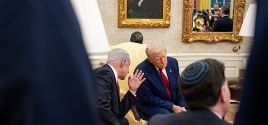Hijacking the Constitution and the Bill of Rightsby Jacob G. HornbergerMay. 08, 2010 |
Popular 
NYT: Trump Ended War With Houthis After They Shot Down U.S. Drones, Nearly Hit Fighter Jets

Ben Shapiro, Mark Levin and Laura Loomer Warn of Foreign Influence... From Qatar

Trump Advisor to Washington Post: 'In MAGA, We Are Not Bibi Fans'

Trump Cut Off Contact With Netanyahu Over 'Manipulation' Concerns, Israeli Reporter Claims

Trump Praises Houthis' 'Bravery'
 In an editorial yesterday entitled “Obama Administration Owes Answers on How It Handled Times Square Suspect,” the Washington Post wants to know whether the Obama administration was too hasty in treating accused Times Square terrorist Faisal Shahzad as a criminal suspect rather than an “enemy combatant.” The Post stated: “The administration rightly came under fire for its handling of the case of Umar Farouk Abdulmutallab, a Nigerian citizen who tried to ignite explosives on a Detroit-bound plane on Christmas Day. In that case, the Justice Department … rashly embraced a law enforcement approach without fully considering other options, including holding Mr. Abdullmutallab as an enemy combatant.” (Emphasis added.) The Post goes on to say: “The Shahzad case is different, primarily because Mr. Shahzad is an American citizen.” The Post’s editorial exemplifies how corrupt America’s federal criminal- justice system has become as a result of the 9/11 attacks. We begin with a fundamental principle, one that even the Post implicitly acknowledges: Terrorism is, in fact, a federal criminal offense. Let me repeat that: Terrorism is a crime under U.S. law. Thus, it shouldn’t surprise anyone that suspected terrorists have always been subject to the rules, guarantees, and protections that relate to the federal criminal-justice system. Grand-jury indictments, jury trials in federal court, criminal-defense attorneys, the presumption of innocence, the exclusion of incompetent and irrelevant evidence, the right to confront and cross-examine adverse witnesses, the right to remain silent, the right to call favorable witnesses, and so forth. So, what does the Post mean when it wonders whether the Obama administration should have considered treating Shahzad as an “enemy combatant” instead of as a criminal defendant? The Post is referring to the alternative, competing system of criminal justice that the Pentagon established in the wake of the 9/11 attacks. It’s a system that is totally unlike the federal court system. Yes, there are still criminal prosecutions for terrorism, but in the Pentagon’s system the defendant is treated in an entirely different way. The Pentagon’s system, for example, encompasses the power to waterboard and otherwise torture people who the feds suspect are guilty of terrorism. The defendant is presumed guilty and treated as such. There is no right to a speedy trial, and defendants can be held forever without a trial. If a trial is ultimately held, the guilt or innocence of the accused is determined by a kangaroo tribunal consisting of military officials, not by regular Americans from the community. At the trial, evidence acquired by torture can be admitted against the accused. The defendant does not have an absolute right to cross examine witnesses, and hearsay evidence can be admitted against him. In other words, ever since 9/11 the United States has had two separate and distinct competing criminal-justice systems, one that is governed by the Constitution and the Bill of Rights, and the other that is governed by brutal, arbitrary, and ad hoc procedures, ones which, by the way, the Constitution and the Bill of Rights were designed to prohibit. Obviously, it makes a world of difference which system a person is subjected to. As the Post editorial implies, that decision — which system to employ against a person accused of terrorism — is entirely arbitrary and ad hoc. Federal officials have absolute and total discretion to make the call. There are no set standards. Let’s assume that Shahzad did, in fact, try to set off the Times Square bomb and that he did it with the active participation of a partner. Under America’s post-9/11 criminal justice system, the feds could treat one of the partners as a criminal defendant and the other one as an enemy combatant, notwithstanding the fact that they allegedly committed the same act. It would be difficult to find a better example of a violation of equal treatment under law and the rule of law than that. When the life and liberty of people turns on the discretionary judgments of government officials as to whether criminal defendants should be accorded due process of law or kangaroo courts, that’s not a system founded on justice but rather a system that makes a mockery of justice. Where did the feds acquire this omnipotent post-9/11 power to completely circumvent the Constitution and the Bill of Rights in federal criminal prosecutions through the arbitrary, discretionary, and ad hoc power to label people accused of terrorism as either criminal defendants or as enemy combatants? They made it up. Out of whole cloth. They knew that terrorism is a federal criminal. They knew that terrorism is listed in the U.S. Code as a federal criminal offense. They knew that accused terrorists, including Ramzi Yousef, the terrorist who bombed the World Trade Center in 1993, had always been prosecuted as criminal defendants in U.S. District Court. But they also knew that the fear-laden crisis of 9/11 gave them an opportunity, the opportunity to make up an entirely new and false doctrine, one that they claimed now entitled them to call a federal crime either a crime or an act of war, one that enabled them to completely circumvent the procedural protections in the Constitution and the Bill of Rights. That’s what they did with the federal crime of terrorism. They didn’t repeal the U.S. Code provisions on terrorism. Those still remain on the books, which is why many suspected terrorists are still prosecuted in federal court. What they did was say, “We now have another option — the option to treat accused terrorists as enemy combatants instead of criminal defendants. We now wield the total and absolute power make that call.” The Post is being disingenuous when it states that “the Shahzad case is different because Mr. Shahzad is an American citizen.” Different in what respect? Is the Post suggesting that there should be one form of criminal justice system — the constitutional one — for Americans and another form for foreigners — the military system? Never mind that such a dual criminal justice system flies in the face of more than two centuries of U.S. history, one in which all persons, not just Americans, accused of federal crimes are entitled to the same criminal-justice system and to the protections of the Constitution and the Bill of Rights. Moreover, Americans had best get used to the fact that the feds now possess the power to treat American citizens as enemy combatants. That’s what the Jose Padilla case was all about. In other words, what they did to Padilla when they were treating him as an enemy combatant — indefinite incarceration, torture through sensory deprivation and isolation, denial of due process, presumption of guilt, and the like — they now can do to all Americans. And this revolutionary transformation of criminal justice, one in which the military now wields omnipotent power over the citizenry, was effected without even the semblance of a constitutional amendment. It’s just another part and parcel of America’s war on terrorism and the U.S. government’s foreign policy of empire and intervention. Not only are the American people being economically bankrupted by that war and that foreign policy, they’re also having their Constitution and Bill of Rights hijacked and circumvented. Jacob Hornberger is founder and president of The Future of Freedom Foundation. Send him email. |



